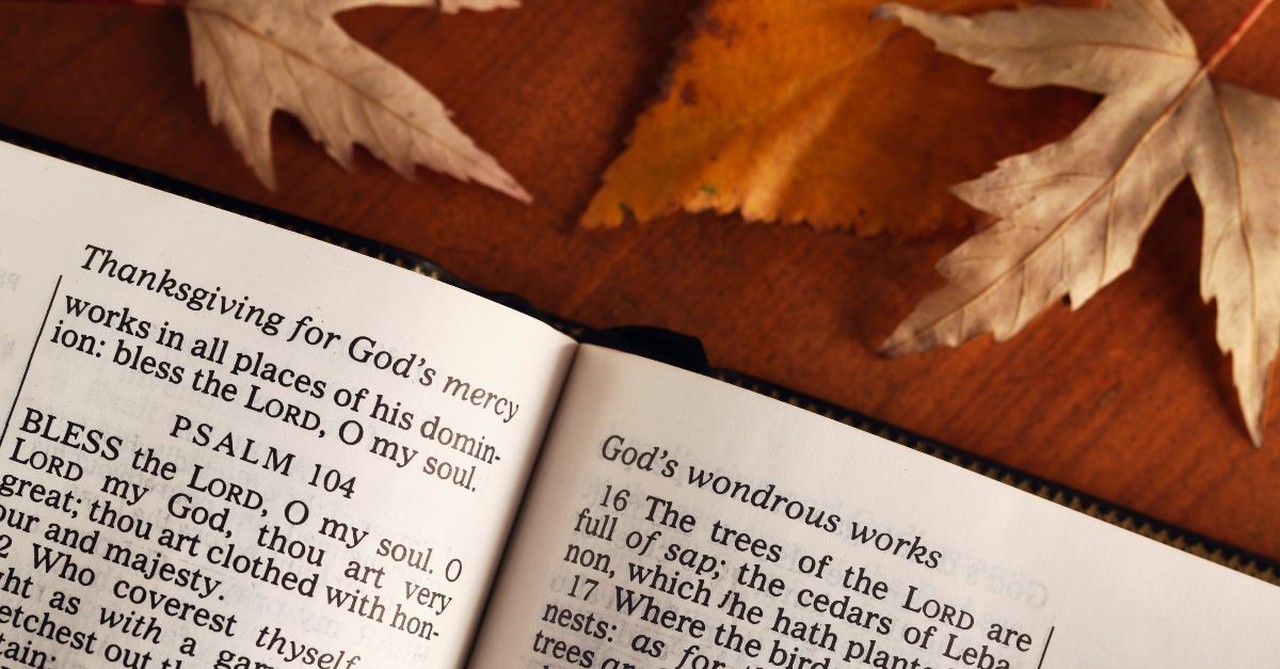
Many songs and hymns that we sing in church or listen to convey our gratitude to the Lord. We may find ourselves singing “Count Your Blessings” or “Old 100th” when we want to give thanks for what God has done in our lives and praising Him for the gracious gift of salvation. Songs give us a way to put our gratitude into expression. For this reason, much of what we sing in worship combines thanksgiving with praise.
This is not a practice confined to the modern day. Scripture provides a wealth of songs that praise the Lord and thank Him for His marvelous deeds of love. Such songs are scattered throughout the pages of the Bible, including the Psalms and beyond.
If we are looking for a way to tell God “thank you,” or we want to cultivate a grateful spirit, then the following six songs in the Bible can help us.
Photo credit: ©Getty Images/Maskot
1. The Songs of Moses and Miriam

1. The Songs of Moses and Miriam
SLIDE 1 OF 6
The greatest act of God’s saving power in the Old Testament is when He brought the Israelites out of Egypt and freed them from slavery. Prefiguring the salvation we have in Jesus, this event encompasses not only the Passover but also the parting of the Red Sea. When everything seemed hopeless and the Israelites were stuck between the sea and the coming Egyptian soldiers, God delivered them. He swept back the waters of the Red Sea, leaving a path of dry ground for them to cross (Exodus 14:21-22). After they had traveled through, with a wall of water on both sides, God returned the waters to their place, drowning the pursuing Egyptian army (Exodus 14:26-29; 15:3-6). The Lord rescued His people!
Directly after this, Moses and the Israelites sang to the Lord in praise and thanksgiving. They exalted God as the only true God who can save. They sang, “I will sing to the Lord, for he is highly exalted. Both horse and driver he has hurled into the sea” (Exodus 15:1; see also Miriam’s song in Exodus 15:21).
In His power and love, God defeated their enemies and released them from slavery. They could not help but show gratitude to the Lord by glorifying Him and recognizing His majesty and holiness (Exodus 15:6, 11). Because of what He did that day, they trusted that God would lead them through the land and protect them from all the other nations – nations that would hear of the Lord’s mighty work and tremble at the coming of Israel (Exodus 15:14-16). They worshiped Him and said, “You will bring them [the Israelites] in and plant them on the mountain of your inheritance — the place, Lord, you made for your dwelling, the sanctuary, Lord, your hands established” (Exodus 15:17).
Our God is mighty to save and deserving of our praise. He redeemed His people from slavery, and He has bought our salvation through His Son, Jesus Christ. Like Moses, Miriam, and the other Israelites, we can worship the Lord through song, praising Him for all He has done.
Photo credit: ©Getty Images/creativica
2. Deborah’s Song

2. Deborah’s Song
SLIDE 2 OF 6
During the time of the Judges, Israel constantly turned away from the Lord. And so, He brought other nations against Israel to make them aware of their sins. After Ehud died, the Israelites again went astray, prompting God to give them over to Jabin the king of Canaan and his commander Sisera (Judges 4:1-3). After twenty years, they cried out to God, and He spoke through the prophet and judge, Deborah, to instruct Barak to fight Sisera (see Judges 4:3-7). God would deliver them.
Yet, Barak was hesitant to go without Deborah, so she declared that the victory would come through a woman instead of him (Judges 4:9). And this is exactly what happened. God routed the armies of Sisera so that the commander sought refuge among the tents of Heber the Kenite, who had an allegiance with Jabin (Judges 4:15-17). What Sisera did not expect was that Jael, the wife of Heber, would take this opportunity to drive a tent peg through the sleeping commander’s head (Judges 4:18-21). On that day, God gave the Israelites victory and delivered them from the oppression of the Canaanites.
Deborah and Barak sang a song about these events in Judges 5, though Deborah is the one who composed the words since she mentions herself as a mother of Israel (see Judges 5:7). The song uses poetic images to praise the Lord and recount what He did that day. For example, she wrote of how the forces of nature trembled at God’s coming to rescue His people (Judges 5:4-5). He raised new leaders for the attack, including Deborah, among those who were willing to fight (Judges 5:6-9). And Jael is specifically blessed in the song for slaying Sisera – as the Lord willed (Judges 5:24). The end of the song triumphantly declares, “So may all your enemies perish, Lord! But may all who love you be like the sun when it rises in its strength” (Judges 5:31).
This song, like many others in Scripture, praises the Lord for His powerful act of deliverance. Thanking God for what He did, the Israelites composed a song that would endure through time to remind them, and us, of His faithfulness.
Photo credit: ©Getty Images/miriam-doerr
3. David’s Song of Thanksgiving

3. David’s Song of Thanksgiving
SLIDE 3 OF 6
Too often, we think of the worship in the Old Testament as solemn occasions when people entered the Tabernacle (and later the Temple) to sacrifice animals. Followers of God certainly approached Him with a knowledge of His holiness, which should make us take worship seriously. However, there was also immense joy in the wholehearted worship of the Lord. David exhibited such joy at the celebration of bringing the Ark of the Covenant back to Jerusalem (1 Chronicles 15:25-29). He danced, laughed, and sang praises to the Lord. The song the choir sang that day was composed by David – a song of praise and thanksgiving (1 Chronicles 16:7).
In the song, we are encouraged to “Give thanks to the Lord and proclaim his greatness. Let the whole world know what he has done” (1 Chronicles 16:8). David invites us to remember all that God has done, specifically His acts of faithful love towards Israel. They are His covenant people, the ones to whom He promised to give the land of Canaan (1 Chronicles 16:14-22). But going beyond the Israelites, David calls on the entire world to sing to the Lord and acknowledge His righteousness (1 Chronicles 16:23-33). For the Lord alone is God, and all the idols of the world are nothing (1 Chronicles 16:26).
Our proper response to hearing about the wonders of God, the One who is holy and just, is to express gratitude and praise. Like that joyous choir at the arrival of the Ark of the Covenant, we should raise our voices in worship to our Lord and Savior.
Photo credit: ©Getty Images/fizkes
4. Psalm 111

4. Psalm 111
SLIDE 4 OF 6
The book of Psalms provides us with numerous opportunities to praise the Lord through music and poetic language. Like many of the other songs listed in this compilation, Psalm 111 extols the deeds of the Lord. Listeners and readers are invited to praise God as they consider His mighty works. As the psalm states, “Great are the works of the Lord; they are pondered by all who delight in them” (Psalm 111:2).
Our God is not a faraway god who is disinterested in humankind. Instead, He is gracious and compassionate, providing for those who fear Him and remain faithful to His promises (Psalm 111:4-6). According to the covenant He made with Israel, He redeemed them and gave them the land of other nations (Psalm 111:6-9). The Lord did this by His power.
At the closing of the psalm, we are left with the reminder that wisdom and understanding start with fear, or reverence, of the Lord (Psalm 111:10). If we want to be wise, then we should listen to the psalmist and meditate on the wonderous works of God. He alone deserves eternal praise.
Photo credit: ©Getty Images/MKucova
5. Mary’s Song

5. Mary’s Song
SLIDE 5 OF 6
Those who attend more traditional, liturgical churches are familiar with the Magnificat, a canticle based on Mary’s words in Luke 1:46-55. The title comes from the Latin word, which means “magnifies,” as in “my soul magnifies the Lord” (Luke 1:46). Although Scripture does not specify as to whether Mary actually sang these words, the song or prayer is a powerful declaration of God’s work in accomplishing His promise to her.
At Mary’s greeting, Elizabeth, her relative, felt the Holy Spirit move within her and she blessed Mary. After this pronouncement of blessing, Mary declared her song. She praised the Lord and rejoiced in His salvation (Luke 1:47). He had shown favor to her, an ordinary Jewish girl. Yet, God had favored her by allowing her the privilege to bear the Son of God, and from that point on all generations would call her blessed, just as Elizabeth did (Luke 1:48). This is characteristic of the Lord, who brings down rulers and kingdoms, but “has lifted up the humble” (Luke 1:52). He is the One who cares for the poor and hungry, showing mercy to those who fear Him.
God was also faithful in remembering His covenant to Abraham and Israel (Luke 1:54-55). The child in her womb testified to this truth, as God sent His Son to be born of a virgin. Mary surely thought of Gabriel’s words that declared the Lord’s favor towards her, and the promise that the child born to her would rule on the throne of David. As promised, “he will reign over Jacob’s descendants forever; his kingdom will never end” (Luke 1:33). God had certainly been faithful and good in sending the Messiah, the Son of God.
We might not commonly think of the Magnificat as a song of thanksgiving. Yet, gratitude for all God had done is evident in Mary’s words. Like her, we can affirm that the Lord has done wonderful things, especially by sending His Son to save us. We, too, should rejoice in God our Savior.
Photo credit: Unsplash/Omar Lopez
6. Zechariah’s Song

6. Zechariah’s Song
SLIDE 6 OF 6
Another beloved canticle sung in many churches is the Benedictus, based on what Zechariah prophesied after the birth of his son, John. Like the Magnificat, Christians sing the Benedictus today, but the passage does not specify as to whether Zechariah sang the words or only spoke them. Regardless, we can read and sing from this section of Scripture to express our thankfulness to God for coming to save us.
As Zechariah said, “Praise be to the Lord, the God of Israel, because he has come to his people and redeemed them” (Luke 1:68). This is in reference to Jesus since He is the horn of salvation from the house of David (Luke 1:69). Praising God is the only response to this promise of salvation, and the blessing of receiving the ability to serve God in holiness and righteousness (Luke 1:71-75).
Turning his attention to his son, Zechariah declares that John will be a prophet and prepare the way for the Lord, a fulfillment of Isaiah’s prophecy (Luke 1:76; Isaiah 40:3). He would call people to repentance to show them their need for salvation from their sins (Luke 1:77). This is exactly what John the Baptist did in preparing the way for Jesus’ ministry (Luke 3:3).
At the end of the song, Zechariah returns to the Messiah’s coming as the Dayspring or rising sun who will “shine on those living in darkness and in the shadow of death, to guide our feet into the path of peace” (Luke 1:78-79; see also Isaiah 9:1-2). Truly, our Savior has come and for this, we should give thanks and praise.
Reflecting on all that the Lord has done in the past, and what He is planning to do in the future, we are prompted to lift our voices in worship. He faithfully kept His promise to come and redeem His people. Let us sing and give thanks, just like the saints of the past did.
Related Resource: The Highways of Worship with Jonathan Brown
In this episode of The Walk podcast, Joshua Swanson, Editor-in-Chief of Worship Leader Magazine, sits down with Jonathan Brown, Chief Global Officer of David C. Cook and former President of Integrity Music. Together, they explore the powerful role of worship music in uniting the global Church across cultural and linguistic boundaries. Jonathan shares stories from his formative years with Delirious, reflects on the international worship movement, and discusses the significance of amplifying worship songs from around the world, including global anthems like Waymaker.
Photo credit: ©Getty Images/Katia Kalinowski

Originally published November 22, 2024.







